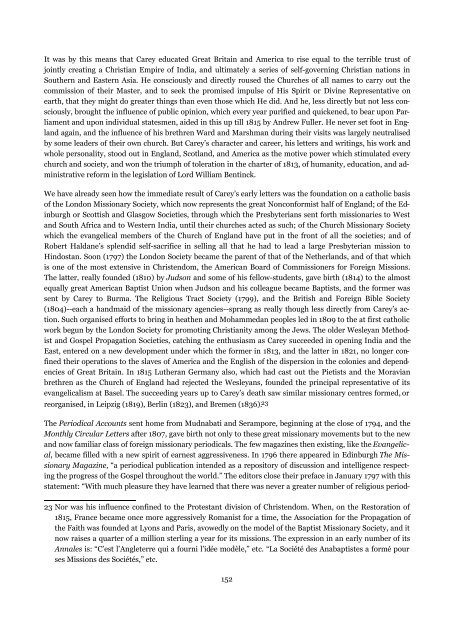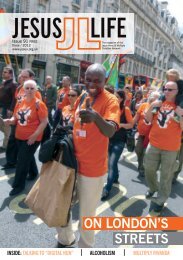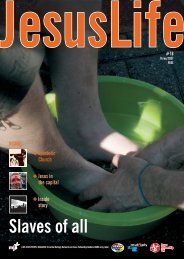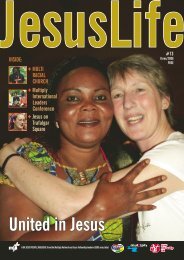Life of William Carey by George Smith - The Jesus Army
Life of William Carey by George Smith - The Jesus Army
Life of William Carey by George Smith - The Jesus Army
Create successful ePaper yourself
Turn your PDF publications into a flip-book with our unique Google optimized e-Paper software.
It was <strong>by</strong> this means that <strong>Carey</strong> educated Great Britain and America to rise equal to the terrible trust <strong>of</strong><br />
jointly creating a Christian Empire <strong>of</strong> India, and ultimately a series <strong>of</strong> self-governing Christian nations in<br />
Southern and Eastern Asia. He consciously and directly roused the Churches <strong>of</strong> all names to carry out the<br />
commission <strong>of</strong> their Master, and to seek the promised impulse <strong>of</strong> His Spirit or Divine Representative on<br />
earth, that they might do greater things than even those which He did. And he, less directly but not less consciously,<br />
brought the influence <strong>of</strong> public opinion, which every year purified and quickened, to bear upon Parliament<br />
and upon individual statesmen, aided in this up till 1815 <strong>by</strong> Andrew Fuller. He never set foot in England<br />
again, and the influence <strong>of</strong> his brethren Ward and Marshman during their visits was largely neutralised<br />
<strong>by</strong> some leaders <strong>of</strong> their own church. But <strong>Carey</strong>’s character and career, his letters and writings, his work and<br />
whole personality, stood out in England, Scotland, and America as the motive power which stimulated every<br />
church and society, and won the triumph <strong>of</strong> toleration in the charter <strong>of</strong> 1813, <strong>of</strong> humanity, education, and administrative<br />
reform in the legislation <strong>of</strong> Lord <strong>William</strong> Bentinck.<br />
We have already seen how the immediate result <strong>of</strong> <strong>Carey</strong>’s early letters was the foundation on a catholic basis<br />
<strong>of</strong> the London Missionary Society, which now represents the great Nonconformist half <strong>of</strong> England; <strong>of</strong> the Edinburgh<br />
or Scottish and Glasgow Societies, through which the Pres<strong>by</strong>terians sent forth missionaries to West<br />
and South Africa and to Western India, until their churches acted as such; <strong>of</strong> the Church Missionary Society<br />
which the evangelical members <strong>of</strong> the Church <strong>of</strong> England have put in the front <strong>of</strong> all the societies; and <strong>of</strong><br />
Robert Haldane’s splendid self-sacrifice in selling all that he had to lead a large Pres<strong>by</strong>terian mission to<br />
Hindostan. Soon (1797) the London Society became the parent <strong>of</strong> that <strong>of</strong> the Netherlands, and <strong>of</strong> that which<br />
is one <strong>of</strong> the most extensive in Christendom, the American Board <strong>of</strong> Commissioners for Foreign Missions.<br />
<strong>The</strong> latter, really founded (1810) <strong>by</strong> Judson and some <strong>of</strong> his fellow-students, gave birth (1814) to the almost<br />
equally great American Baptist Union when Judson and his colleague became Baptists, and the former was<br />
sent <strong>by</strong> <strong>Carey</strong> to Burma. <strong>The</strong> Religious Tract Society (1799), and the British and Foreign Bible Society<br />
(1804)--each a handmaid <strong>of</strong> the missionary agencies--sprang as really though less directly from <strong>Carey</strong>’s action.<br />
Such organised efforts to bring in heathen and Mohammedan peoples led in 1809 to the at first catholic<br />
work begun <strong>by</strong> the London Society for promoting Christianity among the Jews. <strong>The</strong> older Wesleyan Methodist<br />
and Gospel Propagation Societies, catching the enthusiasm as <strong>Carey</strong> succeeded in opening India and the<br />
East, entered on a new development under which the former in 1813, and the latter in 1821, no longer confined<br />
their operations to the slaves <strong>of</strong> America and the English <strong>of</strong> the dispersion in the colonies and dependencies<br />
<strong>of</strong> Great Britain. In 1815 Lutheran Germany also, which had cast out the Pietists and the Moravian<br />
brethren as the Church <strong>of</strong> England had rejected the Wesleyans, founded the principal representative <strong>of</strong> its<br />
evangelicalism at Basel. <strong>The</strong> succeeding years up to <strong>Carey</strong>’s death saw similar missionary centres formed, or<br />
reorganised, in Leipzig (1819), Berlin (1823), and Bremen (1836). 23<br />
<strong>The</strong> Periodical Accounts sent home from Mudnabati and Serampore, beginning at the close <strong>of</strong> 1794, and the<br />
Monthly Circular Letters after 1807, gave birth not only to these great missionary movements but to the new<br />
and now familiar class <strong>of</strong> foreign missionary periodicals. <strong>The</strong> few magazines then existing, like the Evangelical,<br />
became filled with a new spirit <strong>of</strong> earnest aggressiveness. In 1796 there appeared in Edinburgh <strong>The</strong> Missionary<br />
Magazine, “a periodical publication intended as a repository <strong>of</strong> discussion and intelligence respecting<br />
the progress <strong>of</strong> the Gospel throughout the world.” <strong>The</strong> editors close their preface in January 1797 with this<br />
statement: “With much pleasure they have learned that there was never a greater number <strong>of</strong> religious period-<br />
23 Nor was his influence confined to the Protestant division <strong>of</strong> Christendom. When, on the Restoration <strong>of</strong><br />
1815, France became once more aggressively Romanist for a time, the Association for the Propagation <strong>of</strong><br />
the Faith was founded at Lyons and Paris, avowedly on the model <strong>of</strong> the Baptist Missionary Society, and it<br />
now raises a quarter <strong>of</strong> a million sterling a year for its missions. <strong>The</strong> expression in an early number <strong>of</strong> its<br />
Annales is: “C’est l’Angleterre qui a fourni l’idée modèle,” etc. “La Société des Anabaptistes a formé pour<br />
ses Missions des Sociétés,” etc.<br />
152
















